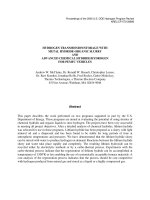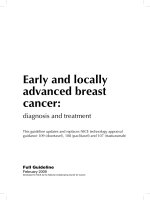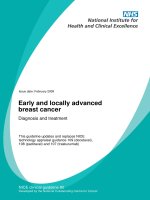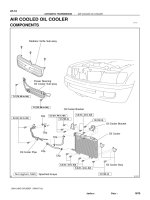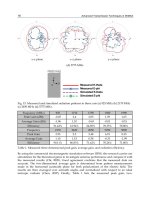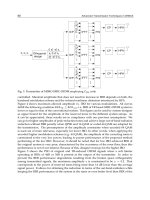37S07T0 advanced automatic transmission diagnosis 2004
Bạn đang xem bản rút gọn của tài liệu. Xem và tải ngay bản đầy đủ của tài liệu tại đây (7.22 MB, 232 trang )
automatic
transmission
advanced automatic
transmission
diagnosis
student reference book
COURSE CODE: 37S07T0
ORDER NUMBER: FCS-14359-REF
Updated January, 2006
Ford Customer Service Division
Technical Training
Course 37S07T0, Slide 1
FCS-14359-REF
Course 37S07T0, Slide 2
Appropriate service methods and proper repair procedures are essential for the
safe, reliable operation of all motor vehicles, as well as the personal safety of the
individual doing the work.
This document provides general directions for accomplishing service and repair
work with tested, effective techniques. Following them will help assure reliability.
There are numerous variations in procedures, techniques, tools, and parts for
servicing vehicles, as well as in the skill of the individual doing the work. This
document cannot possibly anticipate all such variations and provide advice or
cautions as to each. Accordingly, anyone who departs from instructions provided
in this document must first establish that he compromises neither his personal
safety nor the vehicle integrity by his choice of methods, tools or parts.
As you read through the shop manual procedures, you will come across NOTES,
CAUTIONS, and WARNINGS. Each one is there for a specific purpose. NOTES
give you added information that will help you to complete a particular procedure.
CAUTIONS are given to prevent you from making an error that could damage the
vehicle. WARNINGS remind you to be especially careful in those areas where
carelessness can cause personal injury. The following list contains some general
WARNINGS that you should follow when you work on a vehicle.
x
x
x
x
x
x
x
x
x
Always wear safety glasses for eye protection.
Use safety stands whenever a procedure requires you to be under the
vehicle.
Be sure that the ignition switch is always in the OFF position, unless
otherwise required by the procedure.
Set the parking brake when working on the vehicle. If you have an automatic
transmission, set it in PARK unless instructed otherwise for a specific service
operation. Operate the engine only in a well-ventilated area to avoid the
danger of carbon monoxide.
Keep yourself and your clothing away from moving parts when the engine is
running, especially the fan and belts.
To prevent serious burns, avoid contact with hot metal parts such as the
radiator, exhaust manifold, tail pipe, catalytic converter and muffler.
Do not smoke while working on the vehicle.
To avoid injury, always remove rings, watches, loose hanging jewelry, and
loose clothing before beginning to work on a vehicle. Tie long hair securely
behind your head.
Keep hands and other objects clear of the radiator fan blades. Electric cooling
fans can start to operate at any time by an increase in under hood
temperatures, even though the ignition is in the OFF position. Therefore, care
should be taken to ensure that the electric cooling fan is completely
disconnected when working under the hood.
Course 37S07T0, Slide 3
Course 37S07T0, Slide 4
Course 37S07T0, Slide 5
Core Electrical (34) Prerequisites
The Automatic Transmission Curriculum consists of 8 courses
addressing automatic transmission theory of operation, diagnosis, and
service. Each course in the curriculum is a “building block” for the next
course in the curriculum.
This curriculum is designed for technicians who want to learn the
methods and techniques to properly diagnose and service automatic
transmission systems and components. The skills and knowledge
gained from this curriculum will enable technicians to pursue training in
other service specialty areas.
The Automatic Transmission Update course is a Web-based Training
(WBT) course designed as an ongoing source of information on new
transmissions/transmission/transaxles.
The course is required for currently certified technicians. New
technicians do not have to take it.
Currently this course addresses the TorqShift transmission. Future
versions of the course will cover new content.
All technicians will be required to take future versions of the Automatic
Transmission Update course to remain certified.
Technicians will be notified of need to take the course by electronic field
communication. When technicians take the course, it sets the time clock for when
they have to take the next update course.
Course 37S07T0, Slide 7
The Automatic Transmission Curriculum consists of 8 courses addressing
automatic transmission theory of operation, diagnosis, and service. Each course
in the curriculum is a “building block” for the next course in the curriculum.
This curriculum is designed for technicians who want to learn the methods and
techniques to properly diagnose and service automatic transmission systems and
components. The skills and knowledge gained from this curriculum will enable
technicians to pursue training in other service specialty areas.
The Automatic Transmission Update course is a Web-based Training (WBT)
course designed as an ongoing source of information on new
transmissions/transmission/transaxles.
The course is required for currently certified technicians. New technicians do not
have to take it.
Currently this course addresses the TorqShift transmission. Future versions of
the course will cover new content.
All technicians will be required to take future versions of the Automatic
Transmission Update course to remain certified.
Technicians will be notified of need to take the course by electronic field
communication. When technicians take the course, it sets the time clock for when
they have to take the next update course.
Course 37S07T0, Slide 8
Course 37S07T0, Slide 9
Course 37S07T0, Slide 10
Course 37S07T0, Slide 11
Course 37S07T0, Slide 12
Course 37S07T0, Slide 13
Course 37S07T0, Slide 14
Course 37S07T0, Slide 15
Course 37S07T0, Slide 16
The PIDs mode of the scan tool allows you to view:
Course 37S07T0, Slide 17
Course 37S07T0, Slide 18
Course 37S07T0, Slide 19
Course 37S07T0, Slide 20

